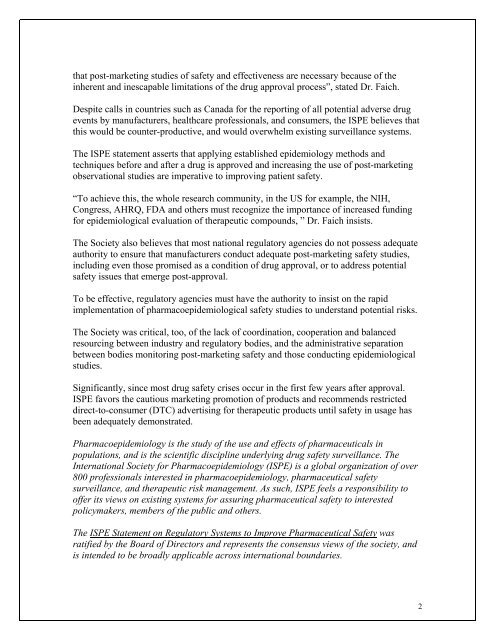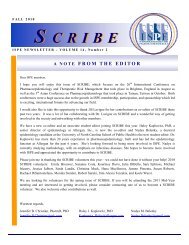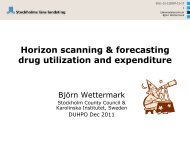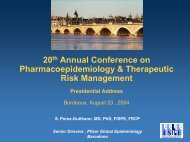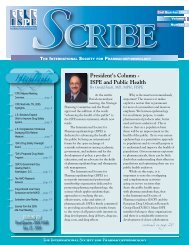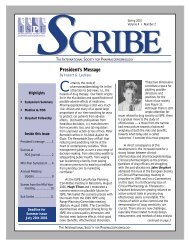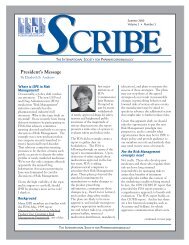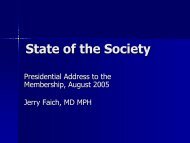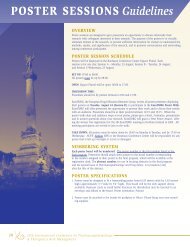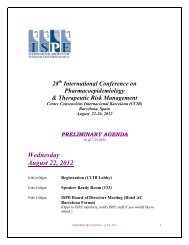International Society for Pharmacoepidemiology (ISPE)
International Society for Pharmacoepidemiology (ISPE)
International Society for Pharmacoepidemiology (ISPE)
Create successful ePaper yourself
Turn your PDF publications into a flip-book with our unique Google optimized e-Paper software.
that post-marketing studies of safety and effectiveness are necessary because of the<br />
inherent and inescapable limitations of the drug approval process”, stated Dr. Faich.<br />
Despite calls in countries such as Canada <strong>for</strong> the reporting of all potential adverse drug<br />
events by manufacturers, healthcare professionals, and consumers, the <strong>ISPE</strong> believes that<br />
this would be counter-productive, and would overwhelm existing surveillance systems.<br />
The <strong>ISPE</strong> statement asserts that applying established epidemiology methods and<br />
techniques be<strong>for</strong>e and after a drug is approved and increasing the use of post-marketing<br />
observational studies are imperative to improving patient safety.<br />
“To achieve this, the whole research community, in the US <strong>for</strong> example, the NIH,<br />
Congress, AHRQ, FDA and others must recognize the importance of increased funding<br />
<strong>for</strong> epidemiological evaluation of therapeutic compounds, ” Dr. Faich insists.<br />
The <strong>Society</strong> also believes that most national regulatory agencies do not possess adequate<br />
authority to ensure that manufacturers conduct adequate post-marketing safety studies,<br />
including even those promised as a condition of drug approval, or to address potential<br />
safety issues that emerge post-approval.<br />
To be effective, regulatory agencies must have the authority to insist on the rapid<br />
implementation of pharmacoepidemiological safety studies to understand potential risks.<br />
The <strong>Society</strong> was critical, too, of the lack of coordination, cooperation and balanced<br />
resourcing between industry and regulatory bodies, and the administrative separation<br />
between bodies monitoring post-marketing safety and those conducting epidemiological<br />
studies.<br />
Significantly, since most drug safety crises occur in the first few years after approval.<br />
<strong>ISPE</strong> favors the cautious marketing promotion of products and recommends restricted<br />
direct-to-consumer (DTC) advertising <strong>for</strong> therapeutic products until safety in usage has<br />
been adequately demonstrated.<br />
<strong>Pharmacoepidemiology</strong> is the study of the use and effects of pharmaceuticals in<br />
populations, and is the scientific discipline underlying drug safety surveillance. The<br />
<strong>International</strong> <strong>Society</strong> <strong>for</strong> <strong>Pharmacoepidemiology</strong> (<strong>ISPE</strong>) is a global organization of over<br />
800 professionals interested in pharmacoepidemiology, pharmaceutical safety<br />
surveillance, and therapeutic risk management. As such, <strong>ISPE</strong> feels a responsibility to<br />
offer its views on existing systems <strong>for</strong> assuring pharmaceutical safety to interested<br />
policymakers, members of the public and others.<br />
The <strong>ISPE</strong> Statement on Regulatory Systems to Improve Pharmaceutical Safety was<br />
ratified by the Board of Directors and represents the consensus views of the society, and<br />
is intended to be broadly applicable across international boundaries.<br />
2


